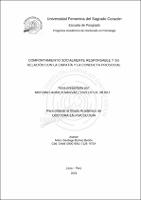Comportamiento socialmente responsable y su relación con la empatía y la conducta prosocial
Abstract
Esta investigación tiene como fin analizar las percepciones y creencias de alumnos
universitarios de una institución privada de Lima, sobre el Comportamiento socialmente
responsable, y establecer si la empatía y el razonamiento moral prosocial tienen relación
con dicho comportamiento. Los objetivos buscan analizar la relación del razonamiento
moral prosocial y de la empatía con la conducta socialmente responsable en estudiantes
universitarios. Los instrumentos usados para el estudio fueron el Interpersonal Reactivity
Index (IRI), el Prosocial Reasoning Objetive Measure (PROM-R) y el Cuestionario de
Autoatribución de Comportamientos Socialmente Responsables (CACSR).
Los resultados indican que, a mayor presencia de un razonamiento moral estereotipado,
disminuyen los comportamientos socialmente responsables ligados a la actividad de
voluntariado y de cuidado de la ecología y medioambiente. A mayor presencia del
razonamiento moral orientado a la aprobación, se da una mayor justificación de las
conductas socialmente responsables en actividades relacionadas a la ecología y
medioambiente, no habiendo relación significativa entre el razonamiento orientado a la
aprobación y las conductas de voluntariado, ayuda social y actividades religiosas.
Contrariamente a lo esperado los comportamientos socialmente responsables no
guardan una relación significativa con el razonamiento moral interiorizado. La relación
entre la empatía y los comportamientos socialmente responsables no es significativa,
pero sí en el caso del factor de Toma de perspectiva, que mantiene una relación baja
pero estadísticamente significativa. The purpose of the present research was to analyze the perceptions and beliefs of
university students from a Private University of Lima, regarding socially responsible
behavior, and to establish whether empathy and prosocial moral reasoning were related
to said behavior. The objectives seeks to analyze the relations of prosocial moral
reasoning and empathy with socially responsible behavior in university students, and 2)
analyze the relation between the empathy with the socially responsible behavior. The
instruments used for the study were the Interpersonal Reactive Index (IRI), the Prosocial
Reasoning Objective Measure (PROM-R) and the Self-attribution Questionnaire for
Socially Responsible Behaviors (CACSR).
The results indicate, the greater the presence of stereotyped moral reasoning, the
socially responsible behaviors linked to volunteering activities and caring for the ecology
and environment decrease. The greater the presence of approval-oriented moral
reasoning, there is a greater justification of socially responsible behaviors in activities
related to ecology and the environment, with no significant relationship between
approval-oriented reasoning and volunteer, social help and religious activities.
Contrary to expectations, socially responsible behaviors do not have a significant
relationship with internalized moral reasoning. The relationship between empathy and
socially responsible behaviors is not significant, but it is significant in the case of the
Perspective Taking factor, which maintains a low but statistically significant relationship.
Description
Tesis


